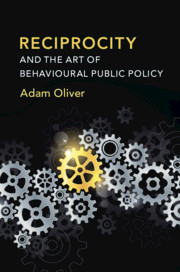Book contents
- Reciprocity and the Art of Behavioural Public Policy
- Reciprocity and the Art of Behavioural Public Policy
- Copyright page
- About the author
- Dedication
- Contents
- Figures and Tables
- Preface
- Acknowledgements
- 1 Setting the Scene
- 2 Animals and Infants
- 3 A Pinch of Anthropology
- 4 A Dash of Behavioural Economics
- 5 The Domain of Reciprocity
- 6 The Dark Side of Reciprocity
- 7 Nurturing Reciprocity in Public Policy
- 8 Reciprocity-Informed Policy Design
- 9 Towards a Political Economy of Behavioural Public Policy
- 10 Summing Up
- References
- Index
8 - Reciprocity-Informed Policy Design
Published online by Cambridge University Press: 06 July 2019
- Reciprocity and the Art of Behavioural Public Policy
- Reciprocity and the Art of Behavioural Public Policy
- Copyright page
- About the author
- Dedication
- Contents
- Figures and Tables
- Preface
- Acknowledgements
- 1 Setting the Scene
- 2 Animals and Infants
- 3 A Pinch of Anthropology
- 4 A Dash of Behavioural Economics
- 5 The Domain of Reciprocity
- 6 The Dark Side of Reciprocity
- 7 Nurturing Reciprocity in Public Policy
- 8 Reciprocity-Informed Policy Design
- 9 Towards a Political Economy of Behavioural Public Policy
- 10 Summing Up
- References
- Index
Summary
This chapter offers some suggestions on how reciprocity might be used to justify specific policy directions. For instance, so long as salaries remain the predominant form of remuneration for public sector employees, performance incentives – both positive and negative – might be beneficial so long as all parties accept that the chosen indicators of good and bad performance are appropriate and deem the corresponding performance-related compensation/penalties as fair. Moreover, insofar as reciprocity is entwined with reputational concerns, a reputational model of governance that threatens to punish bad absolute performance and that supports the implementation of good practice is recommended. Relatedly, group selection theory implies that providing the conditions for reputational competition across regions in relation to public sector services may incentivise cooperation and more innovation within each region, generating lessons that could be shared across regions. Furthermore, given that people naturally reciprocate, framing messages with this fundamental motivational force is worthy of consideration when trying to secure individual behaviour change.
- Type
- Chapter
- Information
- Reciprocity and the Art of Behavioural Public Policy , pp. 128 - 146Publisher: Cambridge University PressPrint publication year: 2019



